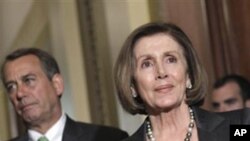While negotiations to fund the U.S. government continue behind closed doors, Democrats and Republicans are pointing fingers at each other over a bitter partisan standoff. Without a budget deal, most non-security federal operations will be halted after Friday, when a temporary spending measure expires.
Although budget negotiations are continuing outside the public’s view, there is no shortage of commentary by congressional leaders on where talks stand. Speaking on the Senate floor Wednesday, Majority Leader Harry Reid blamed Republicans for the budget impasse. He accused the party of rebuffing every Democratic attempt to reach a compromise, and continually issuing new demands to further slash federal spending.
"Republicans refuse to take ‘yes’ for an answer. Every time we agree to meet in the middle, they move where the middle is. They said ‘no’ when we met them halfway. Now they say ‘it’s our way or the highway’. We [Democrats] long ago accepted the fact that the only way to reach consensus [between] a Democratic Senate and a Republican House is to compromise. I wish I could say the same about those on the other side of the negotiating table," he said.
Moments later, Senate Minority Leader Mitch McConnell placed blame for the budget standoff squarely on Democrats. He said they failed to pass a budget for the current fiscal year, which began in October, when they controlled both houses of Congress before the Republicans took control of the House in January.
"Each year, the majority party in Congress is responsible for coming up with a budget plan that explains how they are going to pay for all the things that government does. Well, last year, the Democratic leaders in Congress decided they didn’t want to do it. They didn’t want to have to publicly defend their bloated spending and the debt that it is creating. And they still haven’t come up with an alternative to the various Republican proposals we have seen to keep the government up and running," he said.
Republicans are demanding deep cuts in non-security spending, with no tax increases, to eliminate America’s $1.5 trillion deficit over the next decade and eventually reduce a $14 trillion national debt. Democrats prefer modest reductions in social programs, deeper cuts in defense spending and tax hikes for the wealthy. Both parties acknowledge that programs that provide health care for retirees and the disadvantaged will have to be reformed, but so far only Republicans have issued a detailed plan to do so.
The immediate budget battle concerns federal spending for the remainder of the 2011 fiscal year, which ends in September. But both parties see the fight as the opening salvo of a much larger budget battle to come, and appear unwilling to compromise on core convictions about the role government should play in society.
For New Hampshire Republican Senator Kelly Ayotte, government functions should be kept to a minimum so that they do not interfere with private enterprise.
"Out-of-control spending jeopardizes our nation’s economic strength and costs us jobs. We cannot spend out way to prosperity. The reality is that government does not create the jobs. Small businesses and entrepreneurs create jobs. What we can do in the Senate is to help create the right tax and regulatory conditions to allow our businesses to thrive and grow," she said.
By contrast, Independent Senator Bernie Sanders of Vermont, who caucuses with Democrats, sees government as an essential promoter of the common good.
"The richest people in this country are doing phenomenally well," he said. "The middle class is in decline; poverty is increasing. Republican answer: more tax breaks for the very, very rich, lower corporate taxes, but stick it to [punish] working families. We are at a fork in the road. Do we develop public policy, which protects all of our people, which expands the middle class? Or are we at a moment in history, which moves this country aggressively toward oligarchy, in which you have a small number of people at the top with incredible wealth and incredible power, while the middle class continues to disappear?"
For months, Congress has kept the government running through a series of temporary spending measures, each enacted days before a threatened shutdown. The current measure expires Friday. President Obama has said it is past time for a bipartisan budget deal.
US Government Shutdown Looms, Budget Standoff Continues




